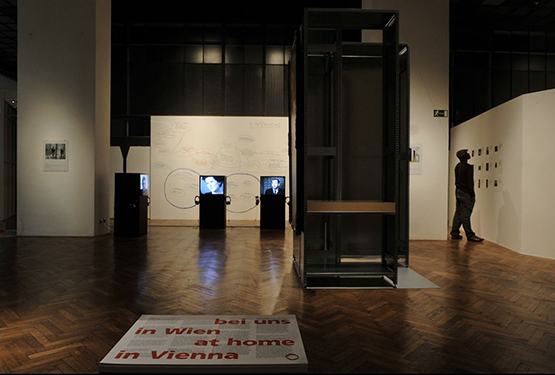Recollecting, MAK, Vienna
Too little, too late
“A word emerges from the people or an individual, it comes from the psyche and is not void of any context. If someone finds a word like compensation (Wiedergutmachung) acceptable, it doesn’t mean I do. I only find restitution acceptable. It’s not compensation (Wiedergutmachung)!”
Unnamed interviewee in Claude Lanzmann’s film Pourquoi Israël (192 min., 4:3, F 1973, production: STEPHANE FILMS)
While working on the film Things. Places. Years (70 min., 4:3, A 2004, production: AMOUR FOU) on Jewish women whose families had been displaced by the Nazis but who had been able to flee to London, we were met with a great deal of skepticism particularly by women of the second generation. At the time we hadn’t been aware of the grave differences in the effects of the Nazi genocide of the Jewish people of Europe on the descendants of both sides.
The difference between the descendants manifests itself, for instance, in the (lack of) freedom to choose whether to deal with Nazism and the Shoah or not: it’s the difference between choosing to and having to, which is also visible in the descendants’ use of language, terms and phrases. In Austria, words frequently heard in connection with the issue are “Wiedergutmachung” (the English translation of which can be making amends, compensation or restitution –Trans.) or even the term “Schlussstrich” (literally: drawing the line, signalizing completion, finalization or closure –Trans.). By contrast, “too little, too late” was the phrase we heard when interviewing the women in London about what they thought of Austria’s restitution politics and policies.
In addition to excerpts from Things. Places. Years our piece also includes clips from a conversation between Andreas Gruber and Greta Fattal in Israel for Gruber’s film Sonderauftrag Linz (90 min., 4:3, A 1999, production: CULT FILM). Greta Fattal had recognized two paintings that had belonged to her father: Rettung auf hoher See by Anton Melbye (1847) and Rückkehr der Fischer bei Sturm by Heinrich Petersen-Angeln (1900) in the Mauerbach auction catalogue prepared by the London auction house Christie’s. She traveled to Vienna in 1998 where both paintings were restored to her.
Greta Fattal had decided to be in the film, but not with her image. Because of this, she can only be seen from behind sitting in front of the second painting. We were intrigued by her decision, which can also be read as a refusal to relinquish her own image and story to a society largely made up of the descendants of Nazi perpetrators and followers (MitläuferInnen) for them to identify without any regard. (Klub Zwei, Translation: Erika Doucette)
